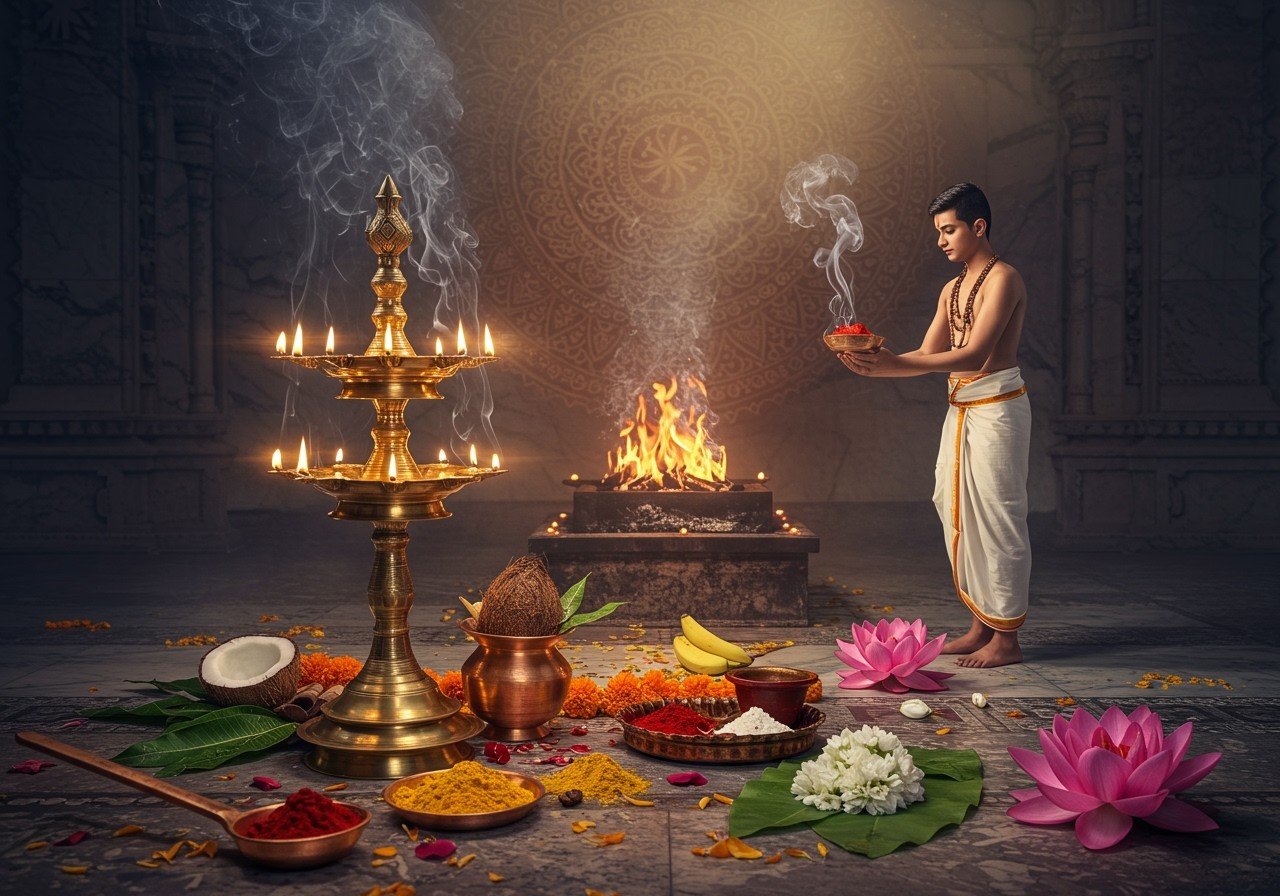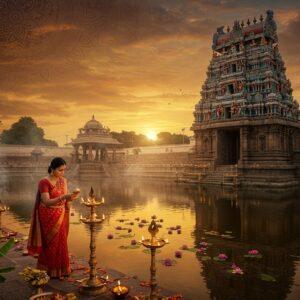
Embark on a journey into the heart of Hinduism, a faith deeply rooted in ancient rituals and vibrant spiritual practices. These sacred ceremonies, rich in cultural and historical significance, are woven into the daily lives of many Indians, particularly those who cherish tradition and seek the convenience of authentic ritual items online. By understanding the origins and significance of these rituals, we can truly appreciate their profound impact on our lives.
The Importance of Puja: A Bridge to the Divine
Puja, the act of worship, holds a central place in Hindu religious practices. It serves as a spiritual bridge, connecting devotees with the divine and transcending the material world. Puja can take many forms, from simple daily rituals performed at home to grand ceremonies conducted in temples. The act of performing puja offers not only spiritual benefits, fostering inner peace and a sense of connection, but also strengthens social and familial bonds by bringing people together in shared devotion.
Every element of a puja, from the offerings of flowers and incense to the carefully prepared environment, holds symbolic meaning. Flowers represent the beauty and impermanence of life, incense symbolizes purity and devotion, and the clean, dedicated space signifies reverence for the divine. In today’s world, online platforms like poojn.in make it easier for devotees to access authentic puja items, enhancing the sanctity and depth of their ritual experience. Understanding the profound importance of puja allows us to appreciate its role in connecting individuals with the divine while preserving our rich cultural traditions.
For all your puja needs, explore the wide range of authentic products available at poojn.in. From diyas and incense to puja kits and more, we offer everything you need to create a sacred space in your home.
Hindu Rituals: A Tapestry of Devotion and Tradition
Hindu rituals are more than just ceremonies; they are a way of life, seamlessly integrating spirituality into our daily existence. They bring God and spirituality to the forefront, reminding us of the divine presence in every aspect of our lives. Rooted in ancient Vedic traditions, these rituals have evolved over millennia, guided by sacred texts like the Vedas and Upanishads. These scriptures serve as a compass, guiding devotees through the various stages of life and offering wisdom for navigating life’s challenges.
These rituals act as a bridge, connecting us with the divine and fostering a deep sense of devotion. They offer a structured approach to spiritual practice, nurturing a stronger connection with the higher powers. Through these practices, feelings of devotion blossom and faith is strengthened, leading to personal and spiritual growth.
Each element within a Hindu ritual is imbued with symbolic significance, acting as a vehicle for understanding complex spiritual concepts. The lighting of a lamp symbolizes the dispelling of ignorance, while the offering of flowers signifies the beauty and impermanence of life. The collective performance of rituals strengthens community bonds, bringing families and friends together in shared purpose and devotion.
Preserving Our Heritage: A Link to the Past
Rituals play a vital role in preserving ancient wisdom and our rich cultural heritage, connecting the present generation with the past. This link to our ancestors enriches our lives, ensuring that our traditions endure through time. By practicing these rituals, we honor the wisdom of those who came before us and keep the flame of our traditions burning bright.
Common Hindu Rituals: Expressions of Devotion
- Puja (Worship): The heart of Hindu practice, puja involves offerings of diyas (oil lamps), incense, and food to deities. These offerings symbolize light, knowledge, purity, devotion, and gratitude. The flickering flame of the diya represents the dispelling of ignorance, while the fragrant incense signifies the purification of the mind and the offering of heartfelt devotion.
- Aarti: The offering of light to deities, aarti signifies the removal of darkness and the arrival of divine blessings. The gentle waving of the aarti lamp before the deity symbolizes our surrender and the welcoming of divine grace into our lives. Find beautiful aarti lamps and other puja essentials at poojn.in.
- Mantra Chanting: The recitation of sacred sounds or phrases, mantra chanting purifies the mind and fills our consciousness with spiritual energy. Mantras are powerful vibrations that connect us with the divine, creating a sense of peace and tranquility.
- Yajna: A sacred fire ritual involving offerings and chanting, yajna invokes the Gods for welfare, peace, and prosperity. The fire symbolizes purification and transformation, offering our prayers and aspirations to the heavens.
- Japa: The continuous recitation of God’s name, japa purifies the mind and fills our consciousness with spiritual energy. This practice cultivates a deep sense of connection with the divine, bringing peace and focus to the mind.
- Prayers, Meditation, Yoga: These common rituals are practiced in Hindu households for reverence, spiritual betterment, and physical and mental well-being. They nurture inner peace, enhance self-awareness, and promote a harmonious balance between mind, body, and spirit.
Rituals Through Life’s Stages: A Sacred Journey
Traditional Hindu teachings describe four stages of life (ashramas), each marked by specific religious rituals and practices:
- Brahmacharya: This stage focuses on acquiring education and enhancing one’s character, laying the foundation for a life of purpose and fulfillment.
- Grihastha: This stage involves worldly pleasures and pursuits, including marriage, family, and career. It is a time of building relationships, creating a home, and contributing to society.
- Vanaprastha: As children reach adulthood, this stage emphasizes an increased focus on spiritual things. It is a time of reflection, introspection, and deepening one’s connection with the divine.
- Sannyasa: This stage involves renouncing the world entirely for a life of contemplation and spiritual seeking. It is a path of detachment and liberation, dedicated to the pursuit of enlightenment.
Significant life events, such as weddings, births, and funerals, are also marked by specific rituals. Weddings feature the Saptapadi, the seven steps around the sacred fire, symbolizing the couple’s lifelong commitment to each other. Funerals involve Antyeshti rites, honoring the departed soul and guiding them on their onward journey.
For specific puja needs related to life stage ceremonies, explore our curated collections at poojn.in. We offer specialized kits and items for various samskaras, ensuring that your ceremonies are conducted with authenticity and reverence.
How Poojn.in Supports Your Sacred Journey
Poojn.in simplifies the observance of authentic Hindu rituals in our busy modern lives. As India’s leading provider of puja samagri and ritual items, we offer a comprehensive selection of high-quality products, all in one convenient location. We are committed to helping you maintain the sanctity and authenticity of your rituals.
We offer a wide range of products for daily rituals (nitya karma) such as: pure kumkum and roli, hawan samagri, and diya. For special ceremonies (vishesh puja), we provide everything from complete puja kits to yantras and traditional vastras for deities.
At poojn.in, we prioritize the purity and authenticity of our products. We source our materials from trusted manufacturers, ensuring quality and adherence to traditional standards. Our products are carefully packaged to maintain their sanctity and delivered safely across India. Our dedicated customer service team is always available to guide you on product selection and answer any questions you may have. Visit www.poojn.in or contact us via phone or WhatsApp to explore our offerings and experience the convenience of having authentic ritual items delivered right to your doorstep.
Embracing the Sacred: A Journey of Faith and Tradition
Hindu rituals offer more than just a path to spirituality; they are a sacred journey interwoven into the fabric of daily life. They nurture a deep connection with the divine while preserving our rich cultural heritage passed down through generations. These practices offer comfort, guidance, and a sense of belonging, strengthening the bonds within families and communities.
As we perform these rituals, we honor the wisdom of our ancestors and keep our traditions alive. Whether it’s the gentle glow of a diya during puja or the resonant chants of a mantra, each ritual brings peace and fulfillment. By embracing these sacred ceremonies, we discover a rhythm in life that balances the spiritual and the worldly, offering a profound sense of purpose and belonging.
In today’s fast-paced world, the convenience of online shopping allows us to access authentic ritual items easily, making it simpler to uphold our traditions. As we continue to participate in these timeless practices, we carry forward the essence of our culture, enriching our lives and the lives of generations to come.
Frequently Asked Questions about Sacred Rituals in Hinduism
What is the significance of puja in Hinduism?
Puja, a cornerstone of Hindu worship, is an act of devotion and gratitude towards the divine. It’s a way to connect with our spirituality, seek blessings, and invite peace and prosperity into our lives. Puja strengthens our bond with the divine, fostering a sense of reverence and love.
Why are sacred rituals important in Hinduism?
Sacred rituals are integral to Hinduism, preserving cultural traditions and offering spiritual fulfillment. They connect us with our heritage, offering a sense of continuity and belonging. Rituals provide a framework for spiritual practice, guiding us towards a deeper understanding of ourselves and the divine.
How do sacred rituals in Hinduism connect to Vedic roots?
Many Hindu rituals trace their origins back to the Vedas, the ancient sacred texts. These Vedic rituals emphasize living in harmony with nature and the cosmos, recognizing the interconnectedness of all beings. They offer profound insights into the nature of reality and our place within the universe.
What role do mantras play in Hindu rituals?
Mantras are powerful sound vibrations that invoke divine energies and deepen our connection with the sacred. They enhance concentration, cleanse the mind, and create a vibrant spiritual atmosphere during rituals. Mantras are considered sacred utterances that carry profound spiritual power.
Can sacred rituals be performed at home?
Yes, absolutely. Many sacred rituals can be performed in the comfort of our homes with proper guidance. This allows families to share in spiritual practices, strengthening bonds and passing down traditions. Creating a sacred space at home enhances the power and intimacy of these rituals.
Why do people use specific items during rituals?
Specific items, such as flowers, lamps, and incense, hold symbolic meaning in Hindu rituals. Flowers represent the beauty and fragility of life, lamps symbolize the dispelling of ignorance, and incense signifies purity and devotion. These items enhance the ritual experience and deepen our connection with the divine.
What should one do if they are new to performing rituals?
If you’re new to Hindu rituals, start with simple prayers and ceremonies. Seek guidance from knowledgeable individuals or family members to understand the significance and proper execution of each practice. There are also many online resources available to help beginners learn and grow in their spiritual journey.
How do online platforms help in performing sacred rituals?
Online platforms like poojn.in offer incredible convenience by providing access to a wide variety of authentic ritual items and resources. They make it easier for individuals to perform rituals with confidence and ease, regardless of their location or access to traditional shops. Poojn.in is dedicated to providing high-quality products and expert guidance to support your spiritual journey.
Hindu Rituals: Significance and Importance
Sacred Texts of Hinduism: A Guide to Key Scriptures
Ganesh Puja Guide: Rituals, Significance, Offerings, and More
Hindu Rituals: Essence, Practices, and Meaning Explained


